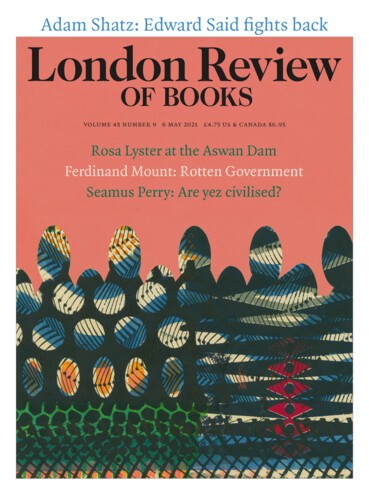In response to a series of adroit questions from Dean Russell about the structural and institutional lessons that might be derived from his experience, Cummings could only return to Johnson’s personal flaws, ‘like a shopping trolley, smashing from one side of the aisle into the other’. It’s true that ‘don’t elect Boris Johnson’ is a useful first step for dealing with any problem, but it is a little galling to hear it coming from the man who masterminded Johnson’s rise.
James Butler
James Butler is a contributing editor at the LRB and the host of the podcast On Politics. He co-founded Novara Media in 2011 and hosted its weekly radio show for several years.
A longer, updated version of this piece appears in the 3 June issue of the paper.
It was a disorienting election: incumbency was obviously an advantage, and the yardstick of what ‘ought’ to happen in a ‘normal’ political cycle is less useful with a government that has branded itself the liberator of its people from European bondage, overseen a vaccination programme that eclipsed its culpable failures earlier in the pandemic, and not yet turned off the economic life support. None of these facts are discernible under Labour’s stagey embrace of sackcloth and ashes, and they have not yet troubled the party’s instinctive factional fighters, who scent advantage in the wind.
A Bloody Stupid Idea: Landlord’s Paradise
James Butler, 6 May 2021
Head out from the moorings on the Thames where I live – passing around the riverfront’s gated colonies and skirting the wharves, long since reanimated as desirable ‘resi’, on which my grandfather had his first job (‘A man’s job, at fourteen’) – and in a few minutes you reach a clutch of houses which might have been grafted from a garden city....
At the British Museum: Tantra
James Butler, 21 January 2021
It began with the beheading of a god. In a dispute over theological primacy, Brahma – traditionally identified as the creator – insulted Shiva. The offended deity poured all his anger into the creation of a new god, Bhairava, who emerged wreathed in fire and shining like the god of death. He tore off one of Brahma’s heads, which immediately attached itself to his hand in...
Failed Vocation: The Corbyn Project
James Butler, 3 December 2020
Broad scope and lofty ambitions can conceal ambiguities and faultlines. Was the goal of the project primarily to wind the clock back, to undo the changes Kinnock and Blair had wrought within the party, and Thatcher in the country as a whole, by returning the trade unions to a central position in Labour and chasing a romanticised version of the postwar settlement? Or was it to bring the post-2008, post-austerity generation which had been so enthused by Corbyn into formal, institutional politics? Could the two ambitions be bridged? Why was it important to change the party’s structure, and how could it happen? Was it intended to put decision-making power back into the hands of union leaders or give it to individual members? How could the middle layers of the party be brought on side? When talking about ‘the project’, who was included? Corbyn and his staff and advisers in Westminster, or the wider circle of activists and party members, or supporters in the country generally? During the last 18 months of his leadership, Corbyn himself, the one man who had sufficient power to impose clarity on any of these questions, seemed barely involved.
Podcasts & Videos
On Politics: Do bond markets and the Bank of England run Britain?
Daniela Gabor, Andrew Haldane and James Butler
Andy Burnham recently said that the government is ‘in hock to the bond markets’, and the political turbulence of the past few years, not least the downfall of Liz Truss following her ‘mini-budget’,...
On Politics: Labour's Problems
James Butler, Chris Mullin, Andy Beckett and Morgan Jones
In this first episode of a new strand in the LRB Podcast, host James Butler talks to former Labour MP and minister Chris Mullin, columnist Andy Beckett and journalist Morgan Jones about whether Labour...
On Politics: Latin America’s Right-Wing Shift
Camila Vergara, Tony Wood and James Butler
James is joined by Tony Wood and Camila Vergara to discuss why the Pink Tide governments in Latin America failed, where the new brand of right-wing politics comes from, and whether the revolutionary energy...
Sorry State
James Butler and Thomas Jones
In the run up to the local elections, and following his recent piece on the care crisis, James Butler joins Tom to discuss some of the other problems facing the UK, and what the two major parties are promising...
Grief Totalitarianism
James Butler, Florence Sutcliffe-Braithwaite and Thomas Jones
James Butler and Florence Sutcliffe-Braithwaite talk to Tom about Britain's new monarch and Prime Minister.
After Johnson
James Butler and Thomas Jones
James Butler joins Tom to consider the fall of Boris Johnson, the candidates hoping to replace him, and what the next few years of British politics might look like.
The Climate Colossus
Geoff Mann and James Butler
Geoff Mann talks to James Butler about the economic models developed by William Nordhaus and others, widely used by governments around the world as a tool to tackle climate change.
Read anywhere with the London Review of Books app, available now from the App Store for Apple devices, Google Play for Android devices and Amazon for your Kindle Fire.
Sign up to our newsletter
For highlights from the latest issue, our archive and the blog, as well as news, events and exclusive promotions.




